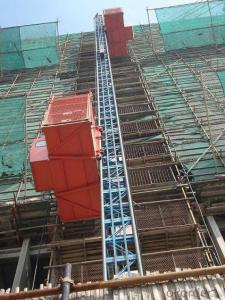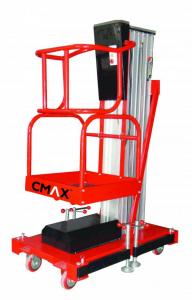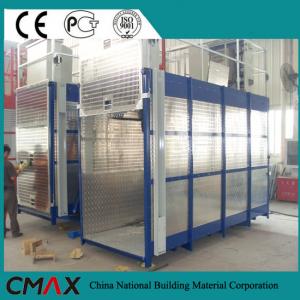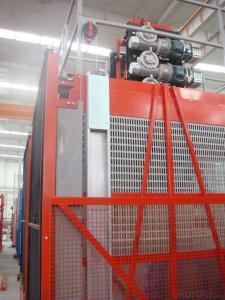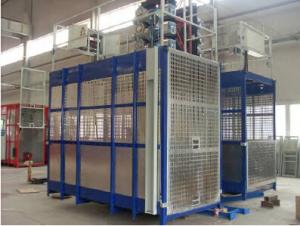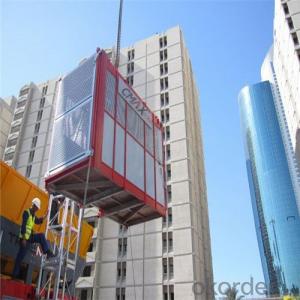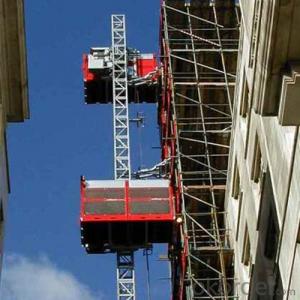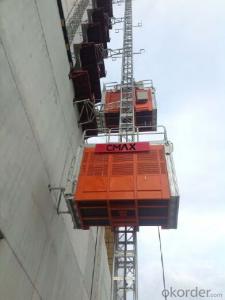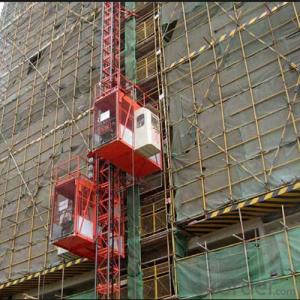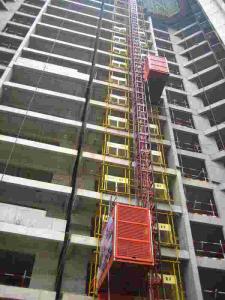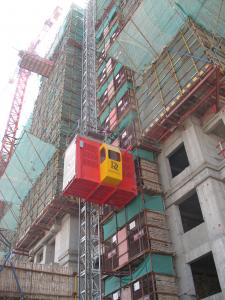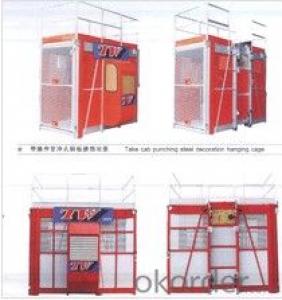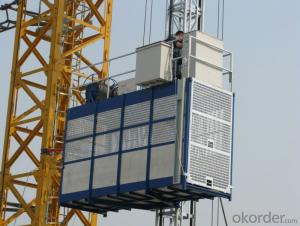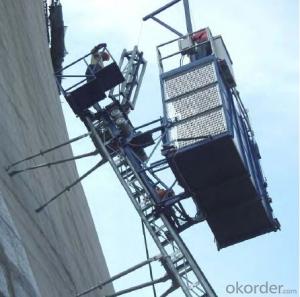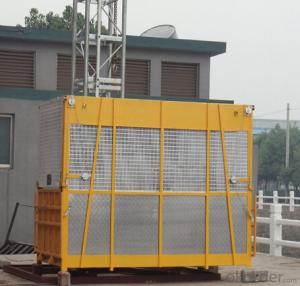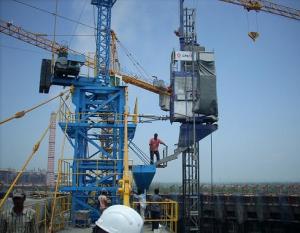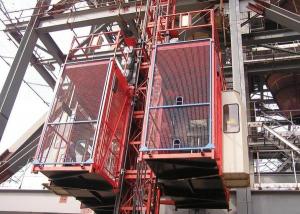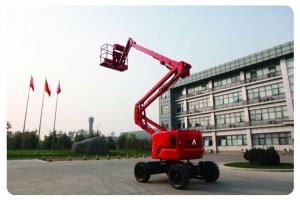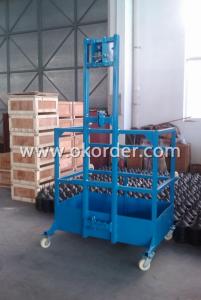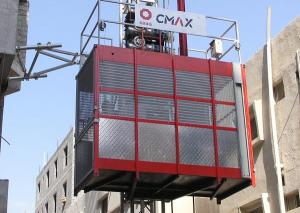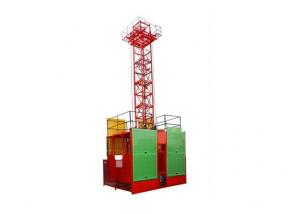Construction Hoist SC100 with Single Cage Hoist
- Loading Port:
- China main port
- Payment Terms:
- TT or LC
- Min Order Qty:
- 1 unit
- Supply Capability:
- 30 unit/month
OKorder Service Pledge
OKorder Financial Service
You Might Also Like
Structure of Construction Hoist Description
1.Feature: Construction Hoist
2.Payload(kg):1000
3.Lifting Speed(m/min):33
4.Motor Power(kw): 2*11
5.Safety Device: SAJ30-1.2
6.Cage: Single
7.Counterweight: No
8.Certification: CE,ISO
9.Place of Origin: China(Mainland)
10.Model Number: Type:SC100
Packaging & Delivery of Construction Hoist
Packaging Detail: Nude package Delivery Detail: 25-30days
Main Parts of Construction Hoist
● The gearing adopts imported bearing, enameled cable, and oil seal.
● The electric parts adopt products from world renowned manufactures such as Schneider, Siemens, and LG.
● The racks and pinion adopts special material and heat-treatment technique, which prolong the life of these parts.
● The steel structure uses quality steel from famous domestic manufactures.
● The surface of the structure can apply paint-spray, parkerozing baking finish or hot galvanizing processing according
to users requirements,
● The cage can be produced and decorated by aluminum molded board, punched-plate or figured aluminm board.
Construction Hoist Specifiction
Single cage High speed
Model | Speed(m/min) | Deadweight(kg) | Motor(KW) | Counterweight | Specification(L×W×H)(m) |
SC100G | 96 | 1000 | 3×22 | No | 2.5×1.3×2.5 |
SC120G | 96 | 1200 | 3×22 | NO | 3.0×1.3×2.5 |
SCD200G | 96 | 2000 | 3×15 | Have | 3.2×1.5×2.5 |
SC200G | 96 | 2250 | 3×22 | No | 3.2×1.5×2.5 |
SC270GS | 96 | 2700 | 3×22 | No | 3.8×1.5×2.5 |
SCD270G | 96 | 2700 | 3×18.5 | Have | 3.8×1.5×2.5 |
SCD300G | 96 | 3000 | 3×22 | Have | 4.0×1.5×2.5 |
SCD320GS | 96 | 3200 | 3×22 | Have | 4.2×1.5×2.5 |
Single cage Medium speed
SC100GZ | 63 | 1000 | 3×15 | No | 2.5×1.3×2.5 |
SC120GZ | 63 | 1200 | 3×15 | No | 3.0×1.3×2.5 |
SCD200GZ | 63 | 2000 | 2×15 | Have | 3.0×1.3×2.5 |
SC200GZ | 63 | 2000 | 3×18.5 | No | 3.0×1.3×2.5 |
SC225GZ | 63 | 2250 | 2×18.5 | No | 3.2×1.5×2.5 |
SC225GZ | 63 | 2250 | 3×18.5 | Have | 3.6×1.5×2.5 |
SCD250GZ | 63 | 2500 | 2×18.5 | Have | 3.6×1.5×2.5 |
SC250GZ | 63 | 2500 | 3×18.5 | Have | 3.8×1.5×2.5 |
SCD270GZ | 63 | 2700 | 2×18.5 | Have | 3.8×1.5×2.5 |
SC270GZ | 63 | 2700 | 3×22 | NO | 4.0×1.5×2.5 |
SCD300GZ | 63 | 3000 | 3×15 | Have | 4.0×1.5×2.5 |
SCD320GZ | 63 | 3200 | 3×15 | Have | 4.2×1.5×2.5 |
Single cage standard speed
SC100TD | 36 | 1000 | 2×11 | NO | 2.5×1.3×2.5 |
SC120TD | 36 | 1200 | 2×11 | NO | 3.0×1.3×2.5 |
SC200TD | 36 | 2000 | 3×11 | NO | 3.0×1.3×2.5 |
SCD200TD | 36 | 2000 | 2×11 | Have | 3.2×1.5×2.5 |
SC270TD | 36 | 2700 | 3×15 | NO | 3.6×1.5×2.5 |
SCD270TD | 36 | 2700 | 2×11 | Have | 3.8×1.5×2.5 |
SC320TD | 36 | 3200 | 3×18.5 | NO | 4.0×1.5×2.5 |
SCD320TD | 36 | 3200 | 2×11 | Have | 4.2×1.5×2.5 |
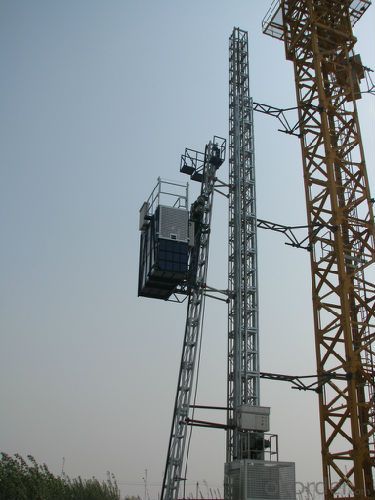
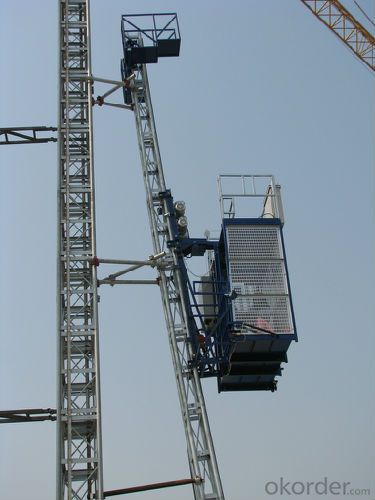
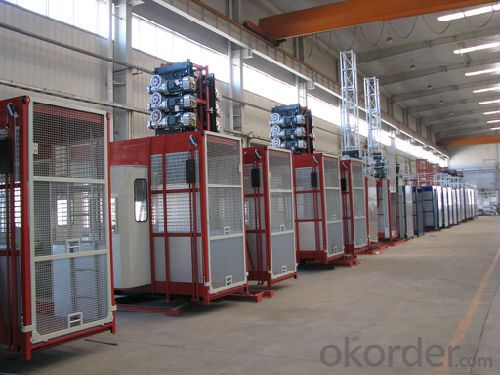
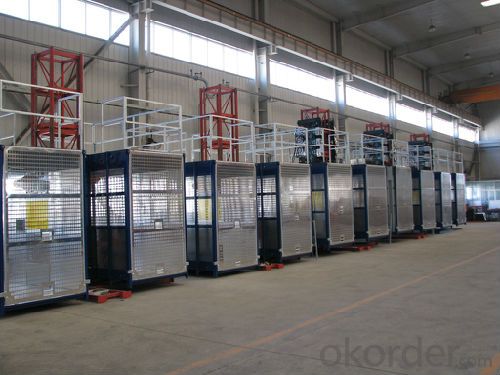
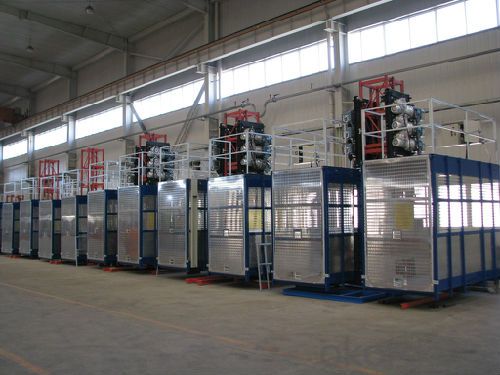
FAQ of Construction Hoist
Q: What is the building hoist main purpose?
A: Building hoist equipped with double or single cabin to transport the materials and labors up and down. It's the ideal
construction equipment for vertical transportation in the field of construction.
Q: What is the main structure of building hoist?
A: The P/M construction hoist mainly contains metal structure, driving system, electrical control system, cable guide &
protection system, electrical top crane and safety device.
Q: What is the meaning of the building hoist’s code?
A: Take SC200/200 for example: “SC” stands for rack and pinion hoist, “200/200” stands for double cage and capacity
is 2 tons per cage. “SC200” stands for single cage and capacity is 2 tons.
Q: What is the dimension of the cage?
A: Normally the cage dimension is 3X1.5X2.5M (L/W/H) for 2t type hoist. Details should be checked according to our
quotation sheet. Also, the size can be customized according to the factual site condition. There are two doors (entrance
& exit doors) for each cage, It can be produced as up & down sliding or ramping model for safety and convenience.
- Q: Can a building hoist be utilized for the transportation of objects within and between buildings?
- <p>Yes, building hoists are specifically designed to move objects vertically within buildings. They are commonly used in construction to lift materials and equipment to different floors. Additionally, they can be employed to transport objects into and out of buildings, especially when access is limited or when heavy loads need to be moved over short vertical distances. However, it's important to adhere to safety guidelines and regulations when operating a building hoist to ensure the secure and efficient movement of objects.</p>
- Q: This question asks for the different types of lifting equipment that can be compatible with a building hoist.
- <p>Building hoists are commonly used in construction projects to lift materials and personnel. Compatible lifting equipment includes various types of hooks, slings, and shackles for securing loads; lifting beams for heavier or bulkier items; and specialized attachments like pallet forks for moving palletized loads. It's crucial to use lifting equipment that is rated for the weight of the load and compatible with the hoist's specifications to ensure safety and efficiency.</p>
- Q: Is it possible to use a manual building hoist to lift multiple objects simultaneously?
- <p>Yes, a manual building hoist can be used to lift multiple objects at once, provided the total weight does not exceed the hoist's maximum load capacity. It's crucial to ensure that the hoist is securely attached to a stable structure and that all safety protocols are followed to prevent accidents. The objects should be evenly distributed and properly secured to the hoist to maintain balance and prevent tipping. Always refer to the manufacturer's guidelines for specific weight limits and safety instructions.</p>
- Q: This question asks for an explanation of the different types of building hoists used in construction.
- <p>Building hoists, also known as construction hoists or material hoists, are essential for moving materials and personnel in high-rise construction projects. The main types include: 1. <strong>Freestanding Hoists</strong>: These do not require a building structure for support and are self-supporting. 2. <strong>Cladding Hoists</strong>: Attached to the building's facade, used for moving materials during cladding work. 3. <strong>Personnel Hoists</strong>: Specifically designed for transporting workers, ensuring safety with features like cages and safety devices. 4. <strong>Material Hoists</strong>: Built to transport heavy construction materials and are robust and durable. 5. <strong>Electric Hoists</strong>: Operated by electricity, offering precise control and energy efficiency. 6. <strong>Hydraulic Hoists</strong>: Utilize hydraulic systems for lifting, known for their smooth operation and heavy load capacity. Each type serves a specific purpose and is chosen based on the project's requirements and the stage of construction.</p>
- Q: This question asks for the process of changing the height at which a building hoist operates.
- <p>Adjusting the height of a building hoist typically involves a few key steps. First, ensure the hoist is powered off and disconnected from any power source to ensure safety. Next, locate the hoist's height adjustment mechanism, which may be a set of bolts or a telescoping column. Loosen any locking nuts or bolts that secure the current height setting. Adjust the hoist to the desired height by raising or lowering the platform or mast. Once the desired height is reached, tighten the locking nuts or bolts to secure the hoist in place. It's crucial to check the manufacturer's guidelines for your specific hoist model, as the process may vary. Always follow safety protocols and consult with a professional if you're unsure about any steps.</p>
- Q: Is it possible to employ a building hoist for demolition purposes?
- <p>While a building hoist is primarily designed for construction purposes, such as lifting materials and personnel to different floors, it is not typically recommended for demolition work. Demolition requires specialized equipment that can handle the specific stresses and hazards associated with breaking down structures. Using a building hoist for demolition could be dangerous and may not comply with safety regulations. It's crucial to use equipment specifically designed for demolition tasks to ensure the safety of workers and the effectiveness of the operation.</p>
- Q: What precautions should be taken when operating a building hoist to ensure safety?
- <p>Safety measures for using a building hoist include ensuring the hoist is regularly inspected and maintained, following the manufacturer's guidelines. Operators must be trained and certified. Load limits must be strictly adhered to, and the hoist should not be overloaded. A safety cage or gate should be in place to prevent accidental falls. Emergency stop switches should be easily accessible. Regular inspections for wear and tear, especially on cables and hooks, are crucial. Never use a hoist if it shows signs of damage or malfunction. Always secure loads properly to prevent them from shifting during transport.</p>
- Q: What are the steps and considerations for maintaining a building hoist to ensure its safety and functionality?
- <p>To maintain a building hoist properly, follow these steps: Regularly inspect the hoist for any visible damage or wear. Lubricate moving parts as per manufacturer's recommendations. Ensure all safety devices are functioning correctly, including limit switches and emergency stop buttons. Check the hoist's electrical system for any signs of damage or wear. Keep the hoist clean and free from debris. Conduct a thorough inspection after any incident or near miss. Regularly test the hoist's load capacity to ensure it is within safe limits. Train operators on safe hoist operation and maintenance procedures. Always follow the manufacturer's guidelines and local regulations for maintenance and inspection.</p>
- Q: Is it permissible to use a building hoist for lifting people or animals?
- <p>No, building hoists are not designed for lifting people or animals. They are specifically engineered for the transportation of materials and construction equipment. Using a building hoist for this purpose is dangerous and can lead to accidents. It is essential to adhere to safety regulations and use appropriate equipment for lifting people or animals to ensure their safety and comply with legal standards.</p>
- Q: This question asks for a description of the process of using a hydraulic cylinder in the context of a building hoist.
- <p>To use a hydraulic cylinder in a building hoist, first ensure the hoist is properly installed and secured. Connect the hydraulic cylinder to the hoist's power source, typically a hydraulic pump. The pump pressurizes hydraulic fluid, which is then directed into the cylinder. As the fluid enters, it pushes a piston within the cylinder, causing it to extend and lift the load. To lower the load, the fluid is released from the cylinder, allowing the piston to retract. Always monitor the pressure and ensure the system is leak-free for safe operation. Regular maintenance, including checking seals and lubricating parts, is crucial to prolong the life of the hydraulic cylinder and ensure efficient hoist performance.</p>
Send your message to us
Construction Hoist SC100 with Single Cage Hoist
- Loading Port:
- China main port
- Payment Terms:
- TT or LC
- Min Order Qty:
- 1 unit
- Supply Capability:
- 30 unit/month
OKorder Service Pledge
OKorder Financial Service
Similar products
Hot products
Hot Searches
Related keywords
